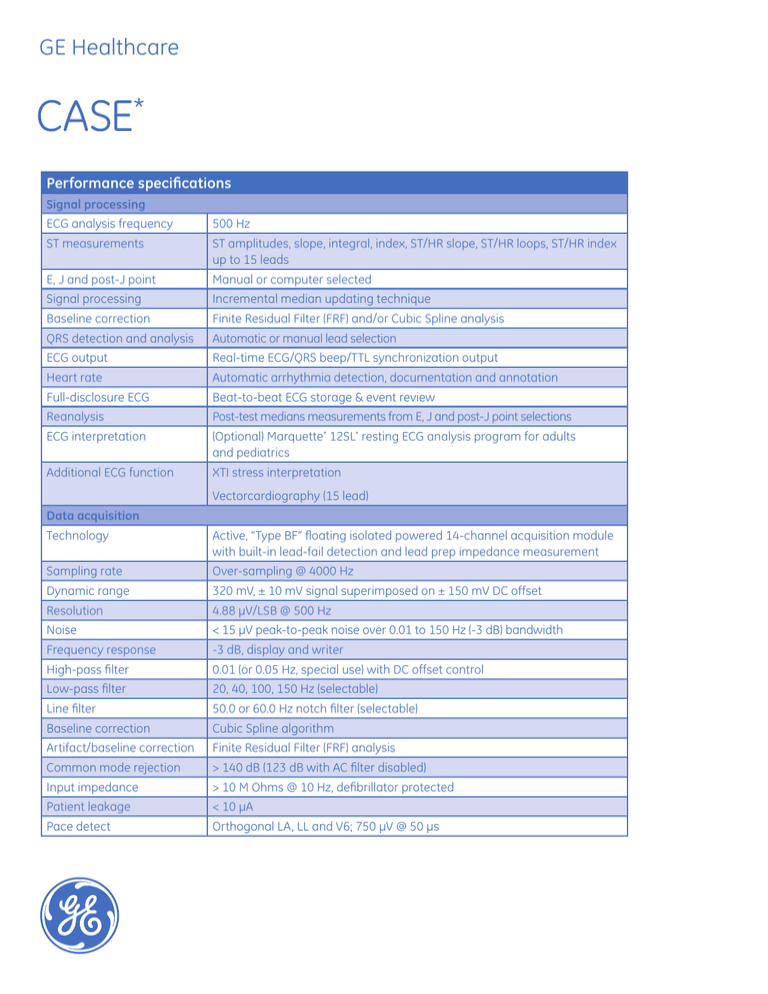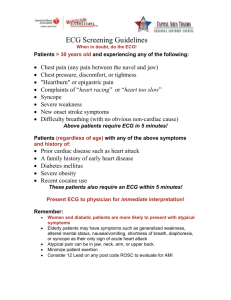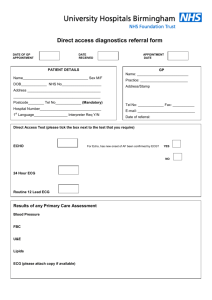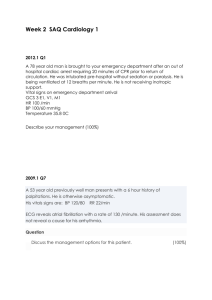
GE Healthcare
CASE*
Performance specifications
Signal processing
ECG analysis frequency
500 Hz
ST measurements
ST amplitudes, slope, integral, index, ST/HR slope, ST/HR loops, ST/HR index
up to 15 leads
E, J and post-J point
Manual or computer selected
Signal processing
Incremental median updating technique
Baseline correction
Finite Residual Filter (FRF) and/or Cubic Spline analysis
QRS detection and analysis
Automatic or manual lead selection
ECG output
Real-time ECG/QRS beep/TTL synchronization output
Heart rate
Automatic arrhythmia detection, documentation and annotation
Full-disclosure ECG
Beat-to-beat ECG storage & event review
Reanalysis
Post-test medians measurements from E, J and post-J point selections
ECG interpretation
(Optional) Marquette* 12SL* resting ECG analysis program for adults
and pediatrics
Additional ECG function
XTI stress interpretation
Vectorcardiography (15 lead)
Data acquisition
Technology
Active, “Type BF” floating isolated powered 14-channel acquisition module
with built-in lead-fail detection and lead prep impedance measurement
Sampling rate
Over-sampling @ 4000 Hz
Dynamic range
320 mV, ± 10 mV signal superimposed on ± 150 mV DC offset
Resolution
4.88 µV/LSB @ 500 Hz
Noise
< 15 µV peak-to-peak noise over 0.01 to 150 Hz (-3 dB) bandwidth
Frequency response
-3 dB, display and writer
High-pass filter
0.01 (or 0.05 Hz, special use) with DC offset control
Low-pass filter
20, 40, 100, 150 Hz (selectable)
Line filter
50.0 or 60.0 Hz notch filter (selectable)
Baseline correction
Cubic Spline algorithm
Artifact/baseline correction
Finite Residual Filter (FRF) analysis
Common mode rejection
> 140 dB (123 dB with AC filter disabled)
Input impedance
> 10 M Ohms @ 10 Hz, defibrillator protected
Patient leakage
< 10 µA
Pace detect
Orthogonal LA, LL and V6; 750 µV @ 50 µs
Performance specifications (cont.)
Communications/storage options
MUSE* systems compatible via SD card; network (optional)
MUSE Web compatible for retrieval view and printing of MUSE system data
Local storage
Minimum 40 GB hard drive storage of complete ECG record
and test results
PDF export of final reports with auto naming protocols also from Microsoft® Word and Excel
XML export of specified data
CASE* network server with editing workstations
Windows® XP operating system
Display
Display type
LCD (flat panel display)
Display resolution
(minimum)
LCD-1280 x 1024
Display size
19'' (48 cm) Liquid Crystal Display (LCD)
Monitored leads
3, 6, 12 or 15
Displayed leads
Number on screen 3, 6, 12 or 15
Display format
3 rhythm, 3 rhythm + medians, 3 rhythm + trends, 6 rhythm,
4 x 2.5 + 1 rhythm, 2 x 6
Display speeds
25, 50 mm/s
Display sensitivity/gain
2.5, 5, 10, 20 mm/mV
Displayed vital signs
data (configurable)
Heart rate, target heart rate, blood pressure, exercise clock, stage
clock, phase clock, protocol, speed, grade, Watts, METS, RRP and SpO2
Displayed data ST scan/median complexes, arrhythmias, ventricular ectopic/min counter, 3 to 12 lead
waveforms, lead check torso and 12 leads, waterfall display, trends, tabular summary, stored ECG
strips, interpretation, time-of-day clock, patient name, warning messages and prompts
Writer
Writer technology
“Instant” load, thermal dot array
Writer leads
3, 6, 12 or 15 leads (standard, NEHB, Cabrera, configurable)
Writer speeds
5, 12.5, 25 and 50 mm/sec (± 2%)
Writer sensitivity/gain
2.5, 5, 10 or 20 mm/mV (± 5%)
Writer resolution
Horizontal 1000 lines/sec x 200 dpi dedicated local printing.
200 x 200 dpi generic printing
Paper type
Thermal, perforated, fan-fold, 300 sheets/pack
Paper size
US letter size 215.9 x 279.4 mm (8.5 x 11.0 in)
A4 size 210 x 297.5 mm (8.27 x 11.69 in)
Physical specifications
Environmental specifications
Height
Power requirements
148 cm (58 in) with no monitor installed
(LCD display rotates vertical and
horizontal for optimum viewing)
Width
62 cm (24 in) with paper tray removed
Depth
75 cm (30 in)
Weight
68 kg (150 lb) without monitor
Power supply
AC operation only
Operating voltage range
100-120 VAC
50-60 Hz, 2.8 A
200-240 VAC
50-60 Hz, 1.4 A
Interfaces included Acquisition module - CAM 14
Keyboard - alpha numeric
Power consumption
350 W max (1200 BTU/hr)
Keypad - dedicated stress function keys
< 250 W normal (850 BTU/hr)
Mouse
< 30 W standby (100 BTU/hr)
Integrated Thermal Printer
10 MB/100 MB/ 1 GB Ethernet MUSE* compatibile
USB ports - 4
Operating conditions
Temperature
+10 to 40°C (+50 to 104°F)
Humidity
20 to 95% RH non-condensing
Storage/transport conditions
Temperature
-40 to +70°C (-40 to 158°F)
(paper discoloration may
occur at high temperatures)
Humidity
15 to 95% RH non-condensing
PS2 ports - 2
Serial ports - 6; COM 1-2, COM A-D,
treadmill, BP, ergometer, SpO2
Analog port - 4; TTL (trigger) - 1;
output (imaging sync) and analog
device communication
Certification
DVD/CD-RW drive: readable; Archive:
CD-RW media only
UL classification, CSA classification, CE marking
SD card - readable
Warranty
Standard warranty is one year
Supplies and Accessories
Contact your local GE Healthcare representative
GE Healthcare
P.O. Box 900, FIN-00031 GE, Finland
GE Direct United Kingdom: +44 (0)800 0329201
www.gehealthcare.com
©2012 General Electric Company – All rights reserved.
General Electric Company reserves the right to make
changes in specifications and features shown herein,
or discontinue the product described at any time
without notice or obligation.
GE and GE Monogram are trademarks
of General Electric Company.
Microsoft, Excel and Windows are trademarks
of Microsoft Corporation.
Pentium is a trademark of Intel Corporation.
GE Healthcare, a division of General Electric Company.
*Trademark of General Electric Company.
EMEA DOC1031232 5/12




